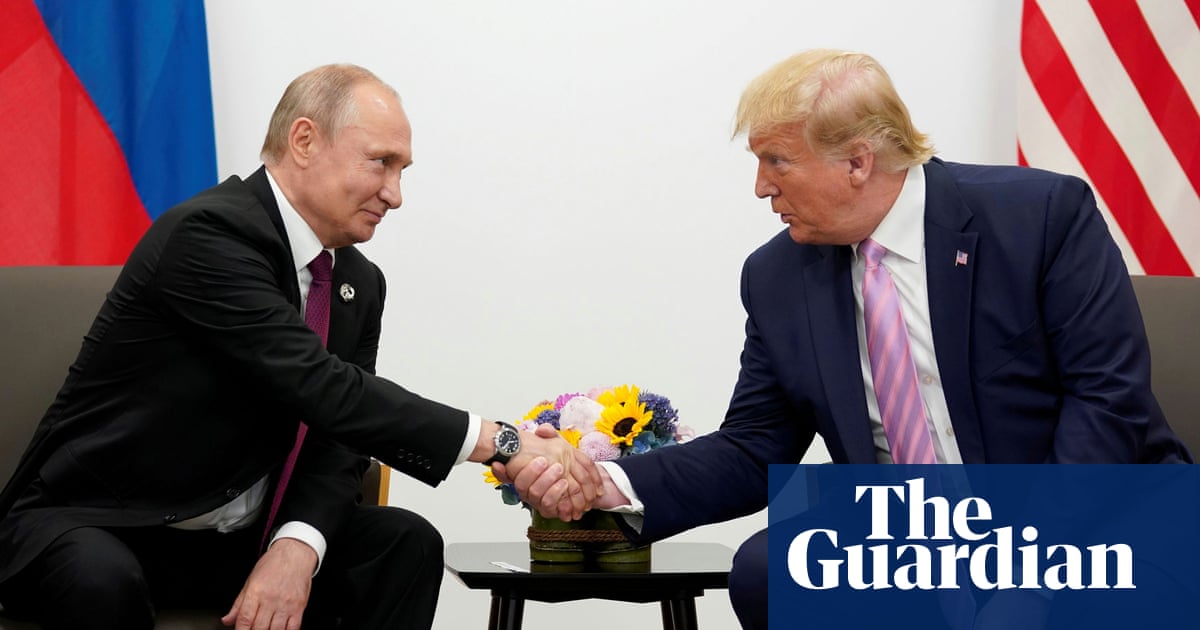Ex-president’s support for the Russian strongman has experts fretting over American interests and security sources overseas
Donald Trump’s continuing lavish praise and support for Russian president Vladimir Putin are fueling alarm among former intelligence officials and other experts who fear another Trump presidency would benefit Moscow and harm American democracy and interests overseas.
Trump praised Putin as a “genius” and “pretty savvy” when Russia invaded Ukraine in early 2022, and has boasted he would end the war in a “day”, sparking critics’ fears that if he’s elected again Trump would help Russia achieve a favorable peace deal by cutting off aid to Kyiv. Trump also recently greenlit Russia to “do whatever the hell they want” to Nato members who don’t pay enough to the alliance.
“Trump views Putin as a strongman,” said Fiona Hill, a senior fellow at Brookings Institution and a national security official in the first two years of Trump’s administration. “In a way they’re working in parallel because they’re both trying to weaken the US, but for very different reasons.”
More recently, instead of criticizing Putin for the death of Alexei Navalny, Russia’s leading opposition figure, who the Kremlin once tried to kill with poison, and who died suddenly last month in an Arctic penal colony, Trump weirdly equated the four criminal prosecutions he faces with Navalny’s fate as political prisoners.



I don’t know that this is the best way of looking at things. There’s a lot of evidence that a great deal of North American megafauna that we have good reason to believe that humans at least contributed to the extinction of after arriving in North America many thousands of years ago. And, considering the buffalo jump, the indigenous of those areas would probably have had no ecological issue with wiping them out if they could have.
Cahokia was a massive North American city near modern St. Louis. It had the largest pre-Columbian population of any city north of the Rio Grande and was probably comparable in population to London and Paris at the same time period. It is believed that the massive deforestation that would have been required to burn enough fuel to support its population was part of the reason it was eventually abandoned. This was actually a huge crisis in Europe in the late middle ages as well and was why the Jamestown Colony’s original purview was to send back lumber.
If the indigenous people of North America had discovered gunpowder, there is no reason to believe they wouldn’t have shot every buffalo in sight, not to mention each other when tensions between groups arose.
Indigenous Americans had a wide array of cultures and beliefs and art. But they were not all gentle farmers and nomads who lived in harmony with the land. They were just normal human beings, with all the amazing and terrible things that go along with that.
Obviously that doesn’t make them any lesser as peoples or as a culture and it doesn’t justify anything they have suffered since.
Indigenous Americans had a wide array of cultures and beliefs and art. But they were not all gentle farmers and nomads who lived in harmony with the land. They were just normal human beings, with all the amazing and terrible things that go along with that.
That goes against my understanding of native culture
Considering I gave specific examples, it sounds like you need a better understanding.
Also, “native culture” is not a thing. There was no unified culture.
I think people are pushing back against that specific passage because it goes a step too far. Both Europeans and the various native tribes of the Americas knew how responsible hunting works. We have bag limits today for that reason, and Europeans of the old country were familiar with the practice.
US government policies on the buffalo were a deliberate genocide, and I don’t think you’ll disagree with that. The phrase “no reason to believe they wouldn’t have shot every buffalo in sight” implies the tribes would have done the same, and that’s just not true.
Would all the tribes have done it? No. That’s the issue here. There was no unified agreement amongst the various indigenous peoples of North America. There were thousands of languages, religions and cultures.
So would the Blackfeet, who basically believed that all bison must die for the good of their people? Probably they would have.
Would the Crow, who hunted more sustainably? Probably not.
So I admit I was being far too general when I said ‘they.’ I should have specified that certain groups would have been fine with wiping out buffalo and others were more sustainable hunters.
Oddly enough, De Soto, who spent a lot of time wandering around what is now the Southeastern U.S., didn’t report buffalo there. So it’s also unclear how widely-ranged they were in the first place. There’s an author named Charles C. Mann who wrote a well-regarded book about pre-Columbian contact called “1491: New Revelations of the Americas Before Columbus” and he posits that the vast buffalo herds later reported in the Great Plains were actually the result of the mass die-off of indigenous peoples through European diseases returning the plains to grassland when they had previously been farmed. So it could be that there were also far less buffalo in the Americas before European contact (although most certainly more than today).
And no, I would not deny the reason why the mass kill-off later happened. It was one of the many genocides the United States perpetrated against the indigenous peoples of the Americas.
I agree with your larger point, but not this one - because they did “discover” gunpowder and guns when they were traded them and they didn’t shoot every buffalo. Yes, they did sometimes shoot each other. (Humans gonna human.) But respect for the earth is a foundational understanding that colonizing Europeans chose to ignore entirely for hundreds of years, up until this very day.